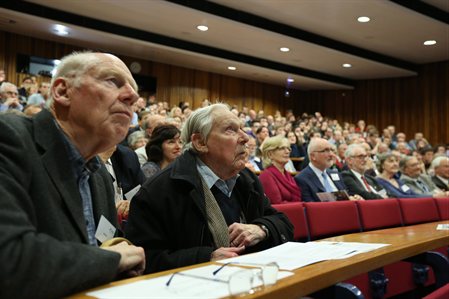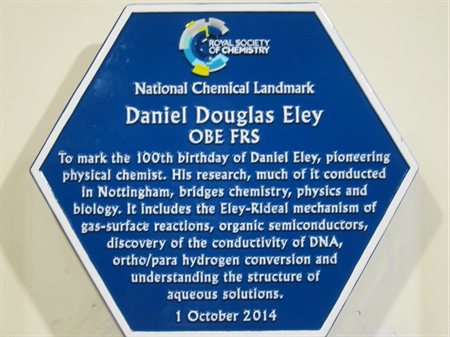Remembering a great Chemist
Professor Daniel Douglas Eley OBE FRS FRSC died on 3rd September 2015 less than a month short of what would have been his 101st birthday. Dan, as he was universally known, was an exceptionally productive physical chemist who worked on an amazing range of fundamental problems during his active research career and remained a passionate scientist right up to his death.
He was appointed OBE for services to science in 1961. His pioneering work was recognised by his election to the Royal Society in 1964, the highest honour for a UK scientist. In 2014, the Royal Society honoured Dan with a special certificate marking the 50th anniversary of his election to the Fellowship.

Professor Dan Eley at his 100th birthday party at The School of Chemistry
During his career, Dan's work pushed the boundaries of our understanding of chemistry across the whole discipline and into biology and physics. He and his students were the first to demonstrate that organic compounds can act as semi-conductors, a scientific breakthrough which eventually led to the colour displays on many of the latest smartphones. His work on DNA led to him showing for the first time that molecules of DNA could conduct electricity, a discovery that underpins a whole area of present day biophysical research.
Dan was born near Liverpool on 1st October, 1914, the son of Fanny and Daniel Eley. When his father was appointed by Sir Jesse Boot as the first advertising manager at Boots, the family moved to Nottingham and Dan spent his early years in the Nottingham suburb of West Bridgford.
During World War II, Dan carried out research on explosives problems for the Ministry of Supply and served in the Home Guard. His wartime experiences provided Dan with a store of anecdotes with which to regale students. After the war, he took up a lectureship in colloid chemistry at Bristol University. In 1951, he was promoted to Reader in Biophysical Chemistry, before his appointment in 1954 as the first Professor of Physical Chemistry at the University of Nottingham. He was an enthusiastic if somewhat disorganised teacher, once lecturing for a whole hour to the wrong class who were too polite to point out his mistake. He was much loved by the undergraduates, one of whom years later set up a web page with some of his more amusing "bon mots".

Professor Dan Eley and colleagues outside the School of Chemistry circa 1970s
In 1942, he married Brenda Williams, a doctor, and they enjoyed 50 years together, until her death in 1992. Dan is survived by his son Rod, a historian, who together with his wife Joy cared for Dan in his final years. Dan had many interests. He shared a love of music with Brenda and, to his death, his living room was dominated by a full-size grand piano.
He was appointed OBE for services to science in 1961. His pioneering work was recognised by his election to the Royal Society in 1964, the highest honour for a UK scientist. In 2014, the Royal Society honoured Dan with a special certificate marking the 50th anniversary of his election to the Fellowship.
For the past 20 years or so, the School of Chemistry at Nottingham has celebrated Dan's birthday with a party. For his 90th birthday party, Nature rashly gave him a lifetime's free subscription in recognition of his devotion to the journal and Dan certainly got his money's worth! Each year, up to and including at his centenary celebrations, Dan made a speech. One year, he touchingly said "When I die, a whole generation of dead scientists will die forever, because there will be no one left who remembers them alive."
<><><>

|
RSC plaque to commemorate Dan Eley located in foyer
a commemorative blue plaque from the rsc now resides in the foyer which celebrates one of nottingham’s great chemists.
jonathan d. hirst, martyn poliakoff, peter j. sarre
|
Posted on Monday 9th November 2015